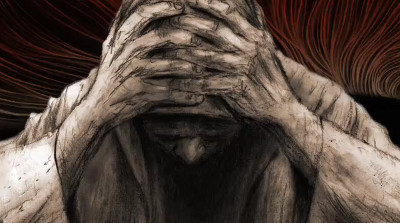The “Why?” of Worship in the Book of Job
 Theologian, Peter Kreeft, calls it, “beautifully terrifying and terrifyingly beautiful”. Praised as one of the greatest pieces of literature in history, I have found it to be all of that and more. Most people know it as the epic story of man’s search for meaning in the midst of horrific evil and suffering. It is that but at its core, the Book of Job is about worship. It’s about why we worship God.
Theologian, Peter Kreeft, calls it, “beautifully terrifying and terrifyingly beautiful”. Praised as one of the greatest pieces of literature in history, I have found it to be all of that and more. Most people know it as the epic story of man’s search for meaning in the midst of horrific evil and suffering. It is that but at its core, the Book of Job is about worship. It’s about why we worship God.
Job is introduced to us as a very wealthy man, a righteous man, with the perfect family, an idyllic life. The scene shifts to the spiritual realm, unseen by Job, and a conversation between God and Satan. And the Lord said to Satan, “Have you considered my servant Job, that there is none like him on the earth, a blameless and upright man, who fears God and turns away from evil?” Job 1:8 Notice it is God who speaks first and He is the One who brings Job to Satan’s attention. God chooses Job, not because he’s bad, but because he’s very good. There’s nothing that Job has done to deserve the suffering that he will endure. God is choosing Job and He’s doing so for some great purpose that Job knows nothing about. And God is using Satan for His purposes. It’s why Martin Luther called him, “God’s Satan”. Satan does what he’s told- nothing more and nothing less.
Among the many questions, there is one that unlocks the entire book and as we will see, this question unlocks the KEY to our suffering and a life of worship. Satan answers God’s question with a question: Then Satan answered the Lord and said, “Does Job fear God for no reason? Job 1:9
Satan’s question has a two-fold implication:
- Job is worshipping God because of all that God has done for Him, not purely because He’s God. Satan’s allegation is that no one worships God out of a pure motive, but only to receive good gifts from God. Worship is simply a law of reciprocity.
- God is not worthy of worship. If He’s not doling out gifts, no human would worship Him.
Satan’s question is at the heart of the book of Job, and it is at the center of your life as well. Evidently, the Lord wants the whole wide world to know the answer to this question. He wants Job to go through suffering, and worship Him through it all, because He wants you and me to show the world what it looks like to worship God through every season of life. But why? What’s at stake? The glory of God. Satan questions the essence of God- His glory- His holiness revealed, His character.
Why Job worships God is the essence of the question. “Why?” gets to the heart, it’s a question of motive, the reason, the purpose. How would we know if Job worships God because of all that God has done for Him or if He worships God because He’s God and worthy of worship no matter what? Only one way. How would a watching world know if you worship God because of all the many good gifts He’s doled out to you, or if you worship Him because He’s God Almighty?
Job is at church every Sunday, but why? He’s reading his Bible and praying every day, but why? He’s giving to God, but why? Unknowingly, Satan is challenging the prosperity gospel, so popular in our day: If you are good and do good things, God will bless you. Many people around the world worship God, seeking to be brought out of their poverty, while others worship God until they’re undone by their wealth.
Of course, this grand experiment results in Job losing everything, but by the end of chapter one it seems Job has won this cosmic challenge, as He cries out “Blessed be the Name of the Lord!” (vs. 21). But it’s not over, and we should be so grateful. If it was over, then the story would be: “Job suffered, Job trusted, be like Job!” I’m so glad that’s not the end. The story goes on. Job loses his health and then come his 3 friends. They’re loving, good friends and they sit with him for an entire week without saying anything. Here we see a beautiful of the ministry of presence brought to a hurting friend. Their silence was brilliant but their words will not him help at all. But before they speak, Job speaks. In chapter 3 we find the darkest chapter in the book. Job curses the day that he was born. The entire chapter is summed up in the single question: “Why?” If you do not know the answer to the why question, life is meaningless, and thus, not worth living.
What do we learn through Job’s questions?
- Job’s questions point him to God. He curses the day he was created, but created he was. And if so, there IS a Creator. In his darkness, Job cannot avoid God.
- Job’s questions reveal hope. His restlessness betrays him. Like the atheist who’s angry with God, whom he claims does not exist. A restless man is not a hopeless man. A troubled woman is not a hopeless woman. If there’s no hope, there’s no need to ask, “why?” He says he wants to die but his restless words and questions betray him and point to life and resurrection.
- Job’s questions anticipate a deeper darkness. His loneliness foreshadows a greater loneliness. His trouble foresees a greater trouble. His darkness forecasts a deeper darkness. His pain foreshadows a greater pain. His suffering anticipates a much greater suffering of One who takes on the wrath of God for the entire world. Job is God-forsaken, pointing to the Day, 2,000-plus years later, when Christ, blameless Lamb of God, would suffer on the cross and ask: “MyGod, my God, why have you forsaken me?” Matthew 27:46
But Job does know something, something big. Later, revealed only by the Spirit of God, job makes a miraculous proclamation:
“For I know that my Redeemer lives, and at the last He will stand upon the earth. And after my skin has been thus destroyed, yet in my flesh I shall see God, whom I shall see for myself, and my eyes shall behold, and not another. My heart faints within me!” Job 19:25-27 Before resurrection theology is fully realized, Job knows.
What does Job know?
- He knows, by faith, his Redeemer is alive. (v. 25) Do you?
- He knows, by faith, his Redeemer will stand upon the earth. (v. 25) This word for “stand” foresees the Incarnation, but the word means to stand as a witness stands in court to bear testimony. Job cries out for a Mediator, someone to plead his case, to defend him before God. Christ alone can stand before our holy God, and Mediate, justify us, vindicate on our behalf. In Christ, God the Judge is also the Redeemer.
- He knows, by faith, he will see his Redeemer with his own eyes. (v. 26-27) God will come in the flesh in Christ. His Redeemer will stand upon every grave of every man and woman in Christ to act as the Redeemer. And on the last day we will stand justified and vindicated before Him- by grace. We know something that Job does not know. We DO know WHY he suffers. We know what Job does not know.
What do we know?
We know of the conversation in ch. 1.
- We know that God was at work in Job’s suffering. God wants everyone to watch Job. It must be very important to God for the Universe to watch a person worshipping Him, through all of life. Job’s sufferings foreshadow the cost of GRACE.
- We know that God was at work in Christ’s suffering. The world watches Christ upon the cross. If worship is reduced to the law of reciprocity then we completely miss out on the greatest News of all- the love of God in Christ to undeserving sinners like us. Christ’s suffering and death reveals God’s great love for us
- We know that God is at work in our suffering. There is, for Christ, an undeserved and redemptive suffering. There is for every believer undeserved and redemptive suffering. Undeserved, but always God is at work in you.
“Not only that, but we rejoice in our sufferings, knowing that suffering produces endurance, and endurance produces character, and character produces hope, and hope does not put us to shame, because God’s love has been poured into our hearts through the Holy Spirit who has been given to us.” Romans 5:3-5
God is at work in your suffering! How can we rejoice in our suffering? Only if the glory of God is the end game and purpose of your lives.
“For I consider that the sufferings of this present time are not worth comparing with the glory that is to be revealed to us.” Romans 8:18 Your suffering is connected to future glory. You will see the purpose of your suffering and God will make all things new. And I believe that those of us who suffer the most will see a greater glory.
You have the opportunity to prove that you worship Him, because He is God and worthy of your worship. This week, a watching world can see that God is God as you worship Him regardless of what comes your way. Your friends, family, children, get a front row seat through every season of your life. And through it all, we have the opportunity to show that God is worthy to glory that He alone is due. God is at work in your suffering and He’s up to something great. Questions in life abound, but if you’ll choose to worship God, especially through suffering, you too will see Him, and others will see the glory of God. Job doesn’t get all of his answers, he gets something much better- he gets God, who is the Answer.



 Thursday night before His death
Thursday night before His death
